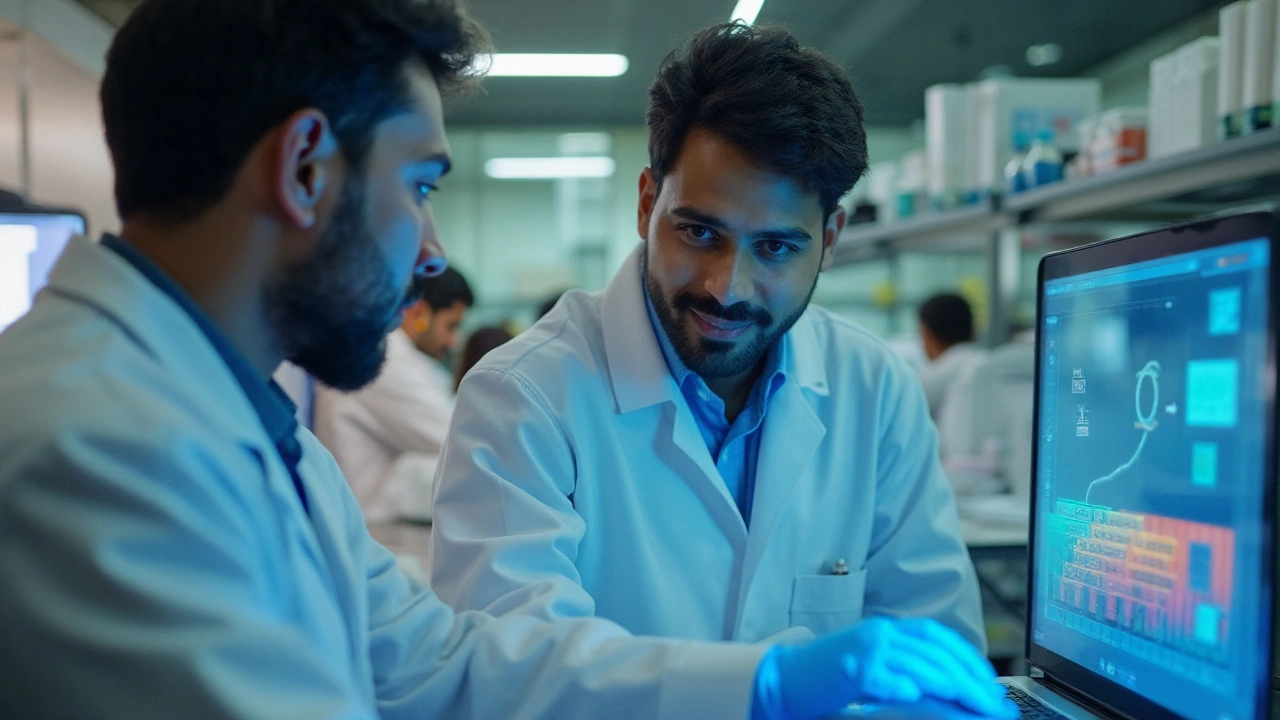Essential Education Pathways for Biotech Careers
 Jan, 14 2025
Jan, 14 2025
Biotechnology is a field that marries the natural world with technology, offering exciting career prospects. Many people eager to enter the industry often wonder what level of education is necessary to succeed. It's not a one-size-fits-all answer, as the requirements can vary based on the specific role one is targeting, but knowing the general expectations can provide a solid foundation for aspiring professionals.
Educational qualifications act as stepping stones in this journey. While some entry-level roles might be accessible with a bachelor's degree in biotechnology or a related field, advancing up the career ladder often means pursuing further studies. Roles in research, development, or leadership may demand a master's or even a Ph.D., allowing professionals to delve deeper into specialized knowledge and research methodologies.
Beyond degrees, certain certifications and skills can set applicants apart. Specialized training programs focused on cutting-edge techniques or technologies can enhance a candidate's resume. Moreover, gaining practical experience through internships and research projects can provide the real-world skills necessary to thrive in this dynamic sector.
- Understanding Education Levels in Biotech
- Key Skills and Certifications
- Academic and Professional Opportunities
- Tips for Aspiring Biotech Professionals
Understanding Education Levels in Biotech
In the fascinating world of biotechnology, education serves as the bedrock upon which rewarding careers are built. The dynamic nature of the field not only makes it exciting but also demands a firm grounding in education. For those embarking on this journey, it's pivotal to understand how various educational thresholds can open different doors within the industry. At the foundational level, a bachelor's degree is typically the minimum requirement for most entry-level roles. Courses in molecular biology, genetics, and bioengineering within these programs offer a comprehensive understanding of the scientific principles driving biotech innovations.
This undergraduate foundation is not just about fulfilling a checkbox requirement. The curriculum often involves hands-on laboratory work that allows students to engage directly with the tools and processes that underpin the industry. Here, students experiment with DNA manipulation techniques, protein synthesis, and data analysis—all critical skills in biotech careers. Institutions like MIT and Stanford are renowned for their robust programs that blend theory and practice seamlessly. This undergraduate experience is essential not only for technical proficiency but also for nurturing the problem-solving mindset that the biotech sector thrives on.
According to the National Center for Biotechnology Workforce, "hands-on experience in laboratories is equally important as theoretical knowledge in the biotech industry."
Moving beyond a bachelor's degree, individuals aiming for specialized roles often pursue master's degrees or Ph.D.'s. These advanced programs delve deeper into specific areas of biotechnology such as bioinformatics, pharmacology, or industrial biotechnology. Master's degree programs, often lasting one to two years, provide focused knowledge and practical training that equips graduates with the expertise required for mid-level positions. Ph.D. candidates, on the other hand, typically engage in cutting-edge research over four to six years, contributing original knowledge to the field while preparing for leadership roles in research or academia.
As the biotechnology industry expands, so too do the educational options available to prospective biotechnologists. Many institutions offer targeted certification programs that hone in on niche areas such as gene sequencing technology or ethical issues in biotechnology. These programs, often lasting less than a year, are particularly valuable for professionals who wish to upskill without committing to a lengthy degree program. They also serve as great opportunities for biotech careers advancement, providing a competitive edge in the job market.
The journey through biotech education doesn't stop at formal education. Continuous learning is a hallmark of success in this ever-evolving field. As new breakthroughs and technologies emerge, professionals must stay abreast of the latest advancements. Many professionals find value in short courses, online learning platforms, and webinars that provide updates on new techniques and trends. This commitment to learning not only ensures relevance in the field but also fosters innovation, a trait highly prized in biotechnology jobs.

Key Skills and Certifications
In the thriving field of biotechnology, acquiring the right set of skills and certifications is as crucial as obtaining your degree. While educational qualifications lay the foundation, skills specific to this sector can propel your career forward and help you stand out in a sea of well-qualified individuals. One must possess a unique blend of technical, analytical, and soft skills to thrive in this industry. Technical skills such as proficiency in laboratory techniques, computational biology, and data analysis are vital. A strong grasp of molecular and cell biology, genetics, and bioinformatics can open scores of doors in both research and applied aspects of biotechnology.
Certifications add another feather to your hat, acting as proof of a specialized skill set. Various renowned institutions offer certifications in areas like GLP (Good Laboratory Practice), GMP (Good Manufacturing Practice), and specific techniques like CRISPR-Cas9 editing. Not only do these certifications enhance your knowledge, but they also demonstrate a commitment to staying abreast of industry developments. In the words of a leading industry expert, “Certifications allow professionals to remain competitive and continuously improve,” highlighting their critical role in career advancement.
The interplay of communication skills is another crucial aspect. Specialists must articulate complex concepts to both scientific and non-scientific audiences, which demands clarity and precision. Teamwork, problem-solving, and project management skills are becoming increasingly important as biotechnology projects often require interdisciplinary collaborations. Candidates should aim to hone these skills to work effectively in teams, perhaps even leading them, and managing projects that may have a tangible impact on human and environmental well-being.
Staying updated with the latest technological advancements through self-study and industry conferences is essential. Being proactive in seeking mentorship from experienced professionals can provide invaluable insights and guidance. Here’s a quick look at some of the certifications that can be pursued:
- GLP Certification: Fundamental for roles in laboratory settings ensuring quality data management and reporting.
- GMP Certification: Critical for understanding quality assurance in manufacturing and processing environments.
- Bioinformatics Certification: Enhances data analysis skills, crucial for roles in research and development.
- CRISPR Training: Learn the methods and ethics of gene editing, a rapidly evolving sector within biotech.
Each certification serves different purposes and career paths. Acquiring these qualifications provides validation of your skill set, which can be the deciding factor for employers. Remember, in biotechnology, continuous learning is part of the career journey. One must always be ready to adapt, learn, and innovate.

Academic and Professional Opportunities
When diving into a career in biotechnology, both academic and professional opportunities play pivotal roles in shaping a successful path. Educational institutions across the globe offer an extensive range of programs tailored to aspiring biotechnologists. From undergraduate degrees that build a foundational understanding of molecular biology and genetics, to postgraduate specialties that delve into immunology or bioinformatics, the options are vast. In western countries, universities like MIT, Harvard, and Stanford consistently rank at the top for their robust biotech programs. Meanwhile, internationally, institutions such as ETH Zurich and the University of Tokyo offer groundbreaking research opportunities and comprehensive curricula.
As you climb the academic ladder, you might find master’s programs that offer a more hands-on approach, often collaborating with industry leaders for internships and on-site training, providing firsthand experience in the rapidly evolving world of biotech. These programs not only hone your lab skills but also equip you with industry-relevant knowledge. Ph.D. programs are even more intense, demanding original research that could potentially lead to industry-changing discoveries. Balancing academic demands with professional opportunities is key; attending conferences, publishing in recognized journals, and networking can significantly impact your career trajectory.
Professionally, the biotech industry is brimming with roles suited for various levels of expertise. Entry-level positions such as lab technicians or research assistants provide a gateway into the industry, allowing you to apply theoretical knowledge in a practical setting. As you gather experience and potentially pursue further education, the doors to management, consultancy, and even entrepreneurship in biotech are wide open. A common stepping stone for many aspiring leaders in biotech is the role of a project manager, where organizational skills and an in-depth understanding of both science and business are paramount.
Joining Professional Organizations
In addition to formal education and work experience, joining professional organizations can be a game-changer. Groups like the Biotechnology Industry Organization (BIO) and the American Society for Microbiology (ASM) offer invaluable resources. They provide networking events, updated industry insights, and opportunities to collaborate on a global scale. Engaging with such bodies can enhance your career, offering mentorship, funding opportunities, and even platforms to publicize your research. "Being part of a professional community is indispensable. It’s where innovation meets collaboration," as stated by a leading scientist during a recent biotech symposium.
Biotech is an industry driven by constant innovation. Statistically speaking, the global biotech sector is expected to grow at a compound annual growth rate of 14% from 2023 to 2028. This demand underscores the importance of practical experience and professional growth opportunities, facilitating a nurturing ground for scientific innovation and breakthroughs. As you pursue your biotech career, remember that education and experience go hand in hand, creating a synergy that propels you toward success in this cutting-edge field.

Tips for Aspiring Biotech Professionals
The dynamic field of biotech careers requires not only academic prowess but a strategic approach to career development. Aspiring professionals should be proactive in acquiring a robust blend of theoretical knowledge and practical skills. One of the most effective ways to prepare for a role in biotechnology is through early involvement in laboratory work and research projects. This fosters a deeper understanding of scientific methodologies and hones critical problem-solving abilities. Furthermore, building a professional network can be invaluable. By connecting with mentors and peers in the field, you gain insights into industry trends and potential career paths you might not have considered before. Internships are another crucial step, offering a tangible way to experience the workings of a biotech company and understand the practical application of academic learnings.
Understanding the importance of continuous learning is vital for anyone aiming to make a mark in biotechnology jobs. This field evolves rapidly, with new techniques and discoveries emerging regularly. Take advantage of workshops, webinars, and conferences to stay updated with the latest advancements. An interesting fact is that companies often look for candidates who are adept at using the latest technology and software relevant to biotechnology, so their ability to learn and adapt is closely scrutinized. Aspiring biotech professionals would benefit greatly from engaging in interdisciplinary studies, integrating knowledge from areas like computer science, engineering, and data analytics. This cross-disciplinary approach not only broadens your skill set but also makes you a more attractive candidate for various roles within the industry.
Building a strong foundational knowledge in molecular and cell biology can’t be overstated. These areas form the bedrock of many biotech innovations. It's also beneficial to remain open to learning new techniques and technologies as they develop. One way to validate your skills and attract attention from employers is obtaining certifications in relevant specializations, such as bioinformatics or genetic engineering. Certifications not only enhance your resume but also demonstrate your commitment to professional growth. According to a report by the Biotechnology Innovation Organization, the demand for professionals with specialized training in niche technologies is poised to grow by up to 12% annually. This statistic highlights the value of targeted skills enhancement.
"Biotechnology is not just a field. It's a journey of discovery and innovation." — Dr. Francis Collins, Former Director of the National Institutes of Health.
Being proactive in gaining experience is just one facet of securing a foothold in biotech careers. Crafting a personalized career path tailored to your interests and skills can significantly enhance your prospects. Create a roadmap that outlines your career aspirations, short-term goals, and the necessary steps required to achieve them. Utilize career resources available from academic institutions or professional organizations that provide job search assistance, resume building tips, and interview preparation. Moreover, consider publishing research or articles in related fields if your area of interest involves scientific research. Such publications not only bolster your academic credentials but also showcase your expertise and commitment to the field.
In essence, the path to a fruitful biotechnology career is a well-rounded combination of education, practical experience, and strategic networking. Whether you're drawn to research & development, clinical trials, or data analysis within the sector, remaining adaptable and informed is key. Always approach your career objectives with curiosity and a willingness to learn, and you'll likely find the biotech industry offers a wealth of opportunities to those prepared to embrace its challenges.